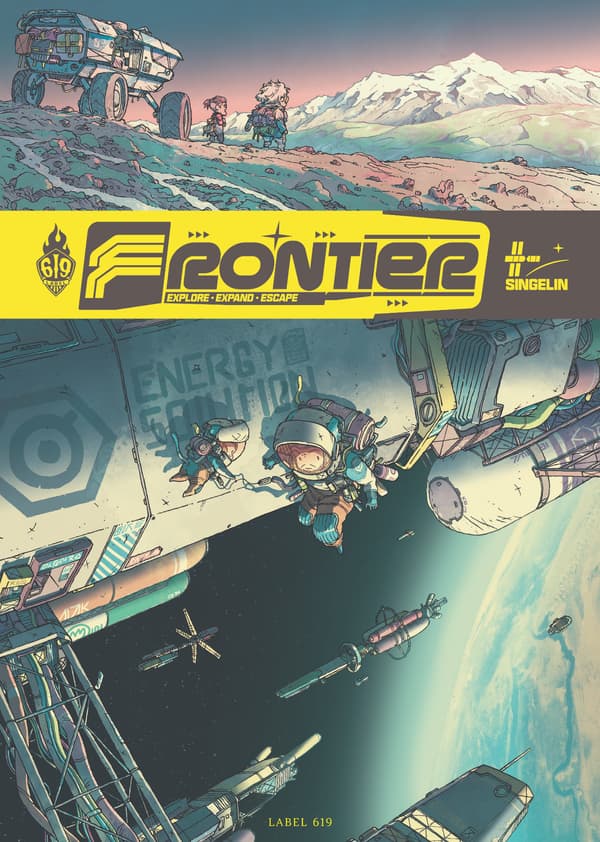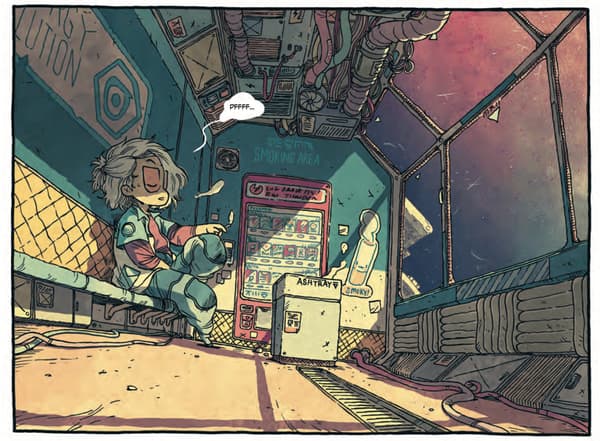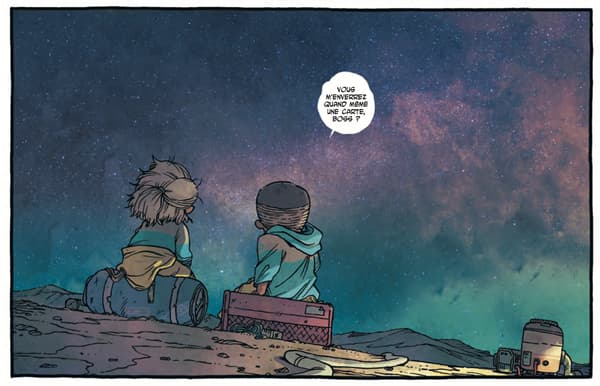Guillaume Singelin publishes Frontier, an SF comic about space explorers, which takes a worried look at the contemporary world and everyone’s place in it. One of the event comics of the year.
Figurehead of Label 619, which dynamites Franco-Belgian comics by mixing the aesthetics of comics with the dynamism of manga, Guillaume Singelin publishes this Wednesday Frontier. A story of SF in the line of Carbon and Silicon by Mathieu Bablet, which immediately established itself as one of the most essential albums of the year, and one of the classics of the genre.
Fruit of a decade of work, Frontier tells the adventures of a trio of characters – a scientist, a mercenary and a miner – in full exploration of a virgin territory, space, while industrial groups gradually begin to colonize it, and to plunder its resources, at the risk of destroying it, like the Earth.
Far from the traditional story of space exploration, Frontier testifies to the worried look that Guillaume Singelin has on the contemporary world and the place that everyone occupies in it. Faced with a profoundly violent, unjust and cynical society, he calls however to be wary of any form of withdrawal into oneself and not to fall into the naivety of collective utopias. “Utopia is never really accessible,” he warns.
Fleeing workplace violence
Although imagined before the recent demonstrations against the pension reform, Frontier echoes it in a disturbing way. Metaphor of the dangers of working in a company, from burn-out to professional exhaustion, Frontier features characters who will put everything in place to escape the violence of the world of work.

In Frontier, her heroines are thus “snatched away their ambition and their will by companies that transform humans into a product”. “Everyone is aware of the harshness of their daily life. But how many people will dare to revolt? It is often easier to ruminate on our discomfort.”
Guillaume Singelin, whose stories most often depict “people who are not well, and who will find their well-being without necessarily breaking everything”, therefore wants to give with Frontier keys “to learn how to no longer suffer”. “The basic idea of the project is to try to reinvent your daily life to live better,” he insists.
The use of the genre of science fiction, and a story of space exploitation, allows “to extrapolate all these ideas”, he adds. “We are in a rather special time in terms of social movements and movements of thought. Of course, SF makes it possible to better digest these ideas.”
Crazy sense of detail
But the designer is not fooled by the impasses of this type of discourse. The graphic discrepancy between its very cartoonish characters and the very realistic settings in which they evolve proves it well. Each box bears witness to an insane sense of detail, which reinforces the feeling of suffocation of the characters. A feeling that they will learn to gradually get rid of.
“They are overwhelmed with cables, computers. I am touched by the things that do not go together. It also makes the characters endearing despite a rather harsh universe”, explains the designer.

This discrepancy between a cute aesthetic and a hyper realistic drawing also allows him to support the idea that one must always be on one’s guard against the violence of the contemporary world. “I’m always a little suspicious. When something goes well, I always wonder if it’s a figment of the imagination, when it’s going to end.”
Science-fiction positive
The fear of abandonment and death is central to Frontier, which addresses in particular the importance of maintaining funeral rites in space, to learn how to better free oneself. “I found the contrast between this world of beliefs and this very pragmatic, very technological universe interesting,” he slips.
Frontier touches the heart with this melancholy worthy of the game Death Stranding de Hideo Kojima ou du manga Galaxy Express 999 by Leiji Matsumoto. In line with these outstanding works of Japanese culture, Frontier shows how to make the best of a situation where death is omnipresent.
“It’s a state of mind that we find in Asian cultures, a kind of abnegation and resilience in the face of events. Life goes on despite the hardships”, explains the one who wanted to turn his back on an approach classic science fiction, mainly developed in the cinema.

“I read a book called Spire by Laurent Genefort, who deals with everyday life, the little people in space. This book made a big impression on me. It’s an approach that I find appealing. I didn’t want to do pure action or pure horror. I wasn’t ready to do a political space opera story either.”
Guillaume Singelin promotes positive SF. If the present is hopeless, the future, at least in fiction, will be less so: “I’m super pessimistic about today’s world. Do I want to exacerbate it in my books? Not really .It’s kind of the only place where I can have optimism in a world that isn’t too pleasing.”



